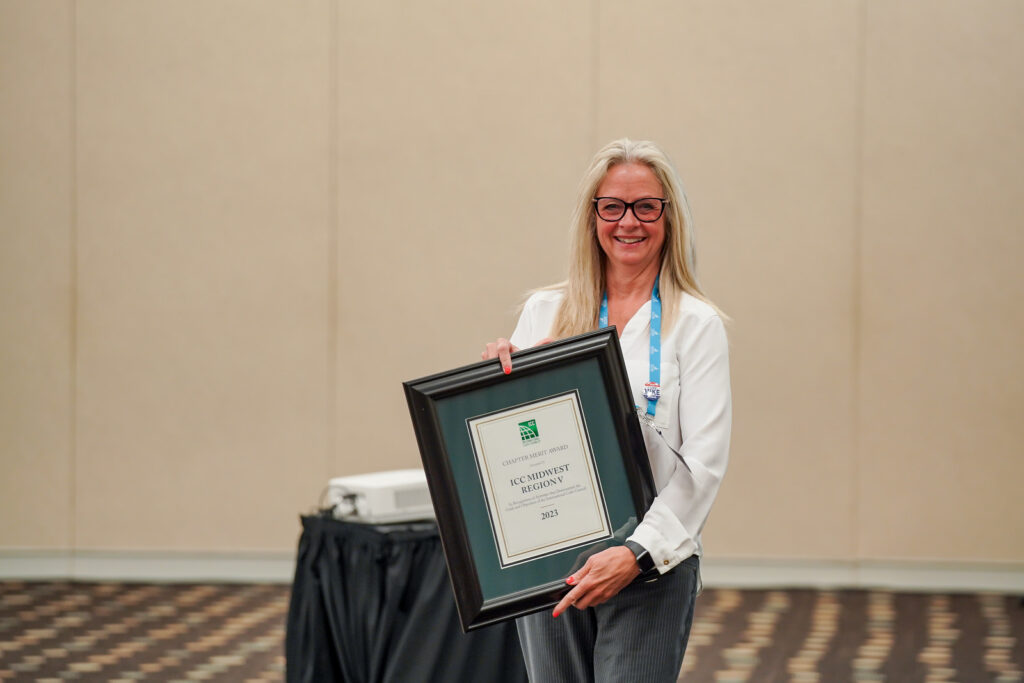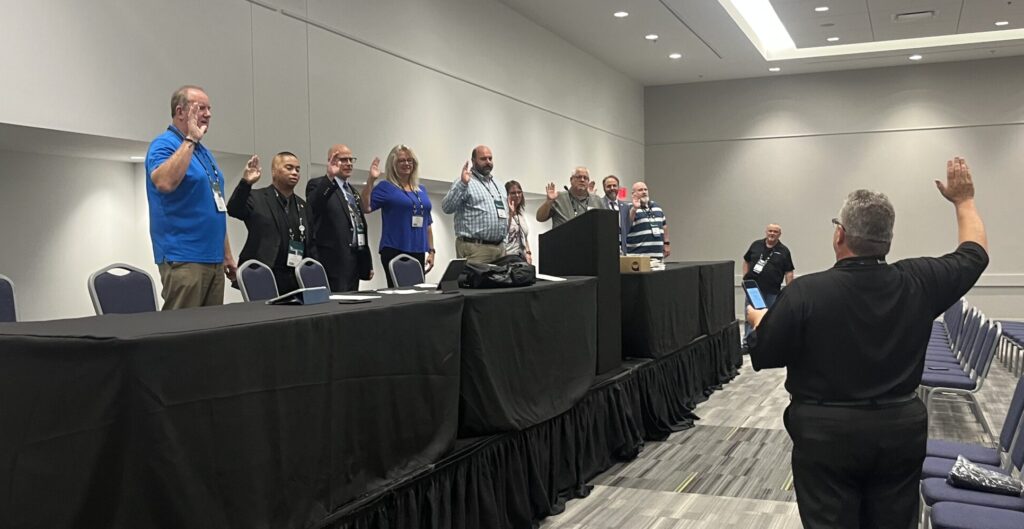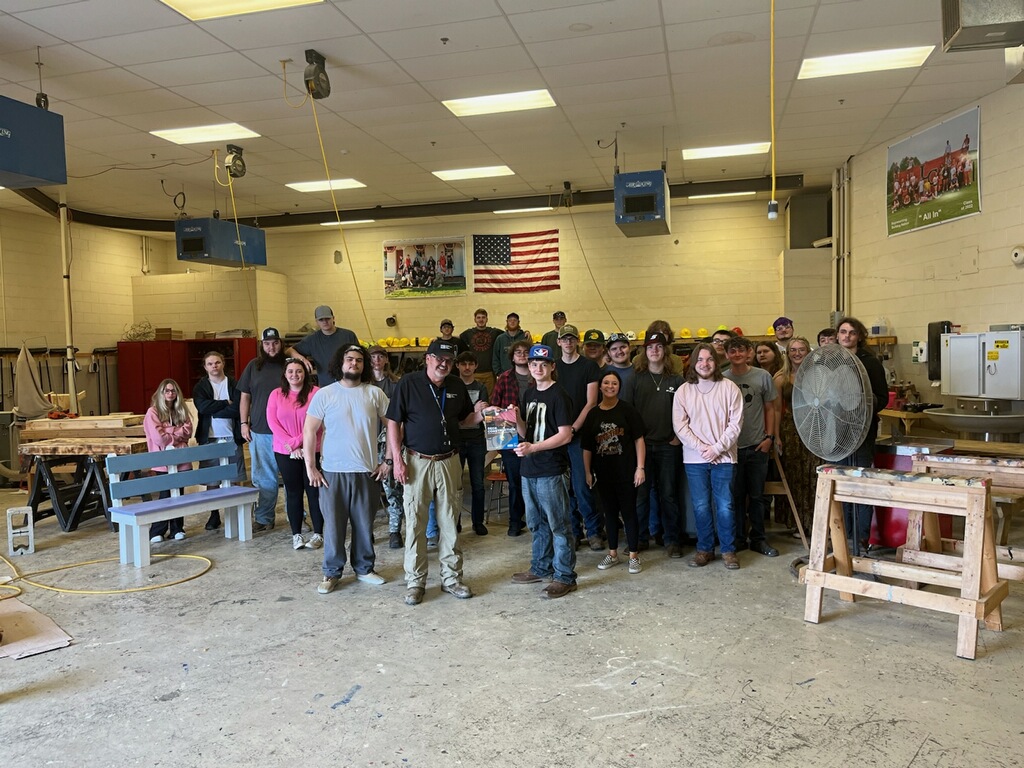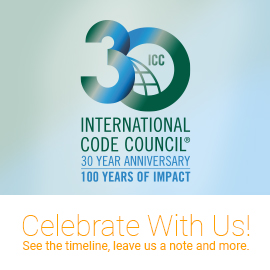
ICC Midwest Region V: On a Quest to Excite Current and Future Generations of Code Officials
Last year during the International Code Council’s 2023 Annual Conference in St. Louis, Missouri, ICC Midwest Region V was honored with the 2023 Chapter Merit Award.
Last year during the International Code Council’s 2023 Annual Conference in St. Louis, Missouri, ICC Midwest Region V was honored with the 2023 Chapter Merit Award. This award is dedicated to chapters exhibiting the Code Council’s goals and objectives. ICC Midwest Region V was recognized for its programs and participation—efforts that have continued to flourish in some impressive and creative ways.
One of the standout qualities of ICC Midwest Region V, encompassing Indiana, Kentucky, Michigan and Ohio, is its high level of engagement. Not long ago, the region’s membership was largely inactive, with annual meetings drawing only five or fewer members.
This changed dramatically, thanks to the efforts of individuals like Renee Snodgrass, Chief Building Official for Central Ohio and Immediate Past President of Midwest Region V. Along with other officers, including James Straws, Paul Featherston and Jim Stocksdale, Snodgrass made it a top priority to increase membership and participation. Their dedication led to a significant revitalization of the region’s activity.
They started organizing monthly Zoom meetings to improve communication between the four state chapters. They actively sought out new officers and member participation in chapter activities, working to promote code enforcement careers and address anticipated staffing shortages through new training programs. They spearheaded outreach initiatives around career fairs and Building Safety Month events. As a result of these initiatives, attendance at the 2023 Code Council’s annual conference from Midwest Region V skyrocketed from just five members to over 120.

Last year, the organization celebrated a 10 percent increase in both the number of members and in members holding at least one Code Council certification – and they are on track to do so again this year.
Over the years, ICC Midwest Region V has continued to energize its members by sponsoring numerous attendees to past Annual Conferences, Committee Action Hearings and Public Comment Hearings through programs including the Code Council Code of Honor scholarships.
That engagement is visible at the individual state level too, particularly for events such as Building Safety Month. Kentucky, for instance, has held the record for securing the most Building Safety Month proclamations since 2013, and the region has hosted several presentations at schools, set up scholarship programs for students and more.
Midwest Region V also expanded industry collaboration through partnerships with organizations such as Sinclair Community College in Dayton, Ohio—a partnership that is changing the face of the code professional in Midwest Region V and beyond.
Encouraging the Next Generation of Building Safety Professionals
Early on in her involvement with Midwest Region V, Snodgrass had a vision of expanding outreach and interest in the profession of inspections and plan reviewers.
She confirms, “Like many others in the construction space, we’re facing a workforce shortage. Studies dating back to 2020 have shown that in our state alone, we’re going to see a 50 percent reduction in code staff by 2025. We’re already stretched so thin and it’s increasingly difficult to find people who are interested and certified in this field. When I became an officer with the Code Council, my goal was to get the word out about this great profession, and perhaps provide a new avenue that hadn’t been considered or realized.”

Over the last two years, Snodgrass and others in Region V have hosted code-related events with union trade halls, vocational schools and community colleges that had construction programs. They talked about what it takes to become certified, highlighted an inspection and plan review, and walked through a daily routine.
“We also highlighted the benefits of this profession, such as job security, good retirement system and overall stability—as well as the larger mission to improve building safety and the environment,” she adds. When students had questions, Snodgrass and her team became mentors, answering questions and providing guidance.
Now that idea is evolving into one of the first code enforcement training programs in the industry.
Working Together to Support the Building Safety Industry
Looking to expand on the potential opportunities realized in the outreach and mentoring activities, Snodgrass began working with the Code Council and Sinclair Community College in Dayton. She recalls, “While at an Ohio Building Officials Conference, I met with Dan Miller to talk about building a code-focused training program.”
Miller is an instructor at Sinclair College teaching commercial and residential codes and a contract plans examiner for Montgomery and Greene Counties. He’s been integral to incorporating building codes into both construction and architecture programs for several years.
Beginning in the Fall of 2024, Sinclair Community College will have an updated curriculum for the current code class that teaches building code administration, residential code and commercial code (based on Code Council resources).
Miller says, “Coincidentally, we’ve been trying to get a similar code-focused program together for years. Recently, I have had several students ask about becoming a building inspector.”
To that end, Miller is setting up a self-paced certification preparation class using the Code Council Technical Training Program that should be available for the Spring 2025 semester. If the certification prep class works out for inspector certification in the spring semester, the program could expand into a certification class for permit technicians.
Charlie Setterfield, professor in the Architectural Technology Program at Sinclair, believes this concept of targeted code enforcement is a great opportunity to dive deeper into the code and bring in new people to the industry. “Traditionally, building inspectors and plan reviewers are highly experienced industry professionals. I firmly believe that we can broaden our workforce opportunities to younger generations with targeted programming.”
He points to a similar effort with the Ohio Department of Transportation that focuses on highway inspections. These short-term certificates (Level 1 and Level 2) prepare students to take the National Institute for Certification in Engineering Technologies certification for Highway Construction Inspection—and include internship opportunities.

Miller hopes that by the fall semester in 2025, Sinclair will have the code curriculum fully revised and the residential inspector certification preparation class fully in place. He adds, “The next step of the process will be to work with local building departments to have internship positions made available and funded. This will involve working with these departments to get this into their budget for the next year—and ideally get the internship program in place by the spring semester in 2026.”
Additionally, the State of Ohio Board of Building Standards is proposing new certification requirements to allow approved formal training programs such as the Sinclair Program to be recognized for part of the experience requirements along with passing the required exams to become a certified Inspector.
Snodgrass concludes, “My vision is to eventually have a full well-defined, credential-focused code enforcement program that will shape job-ready graduates to fill critical roles in the industry.”
Whether it’s an outreach initiative to promote code enforcement careers or hosting monthly meetings to spotlight industry programs and certifications, Midwest Region V is pushing new boundaries and expanding career pathways.
Learn more about the Code Council’s annual award program here.





